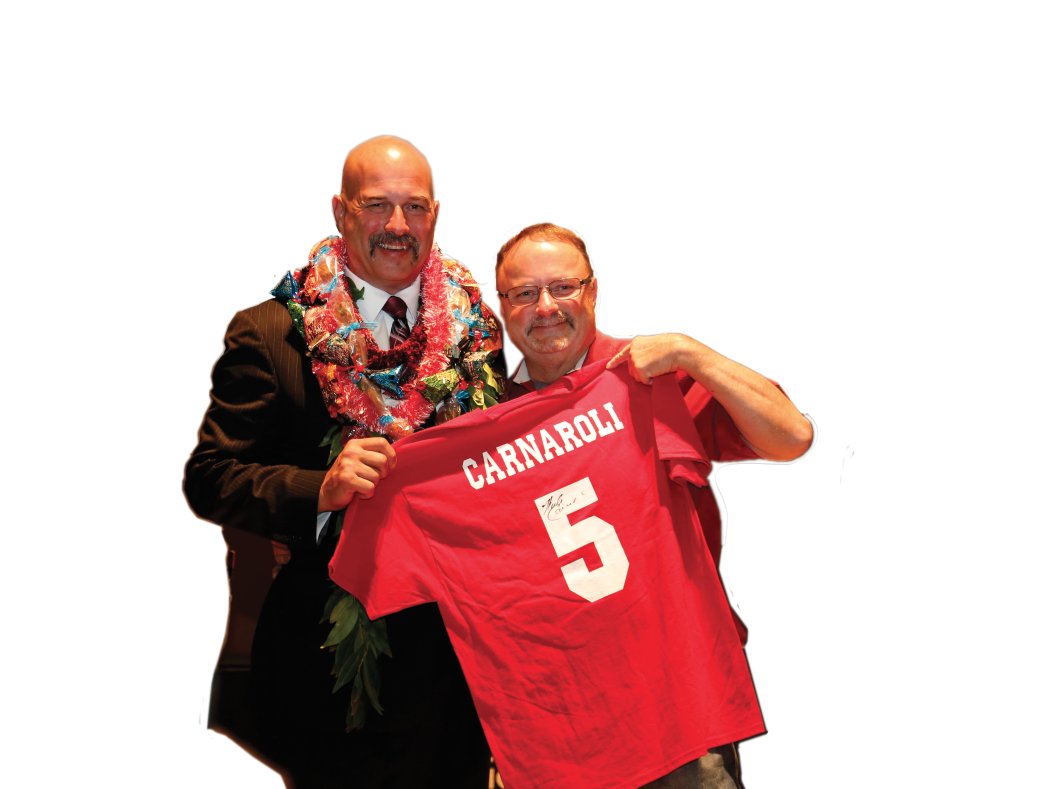
As a judge, Rick Carnaroli ’80 has an inside view of the legal system.
And the power to make improvements.
That’s why in 2012, he helped start a veterans treatment court in his jurisdiction in Bannock County, Idaho.
The region already had other problem-solving courts — for substance abuse and mental health issues — designed to identify offenders who were more likely to benefit from a treatment plan than jail.
But those systems weren’t working for offenders who were also veterans.
“We were actually screening veterans out, because they were doing so poorly,” he said.

In an article for The Advocate, a publication of the Idaho State Bar, Carnaroli wrote about a highly decorated Marine veteran who had been wounded by a suicide bomber in Iraq and returned to the States with post-traumatic stress disorder. He turned to alcohol to self-medicate and accumulated three driving under the influence charges in 30 days.
“Due to his PTSD, ‘John’ was diverted prior to sentencing and ordered to successfully complete Mental Health Court,” Carnaroli wrote. “‘John’ performed miserably in Mental Health Court, failed to progress, and was sanctioned and jailed repeatedly.”
Later, Carnaroli wrote, his caseworkers admitted that the treatment providers available through the Mental Health Court didn’t have the training to treat participants with PTSD or traumatic brain injuries, particularly those from military backgrounds.
“I saw — and other people in our community saw — a need for something different,” Carnaroli said.
“We put them back into the military unit mentality … We allow them to ride together, associate with one another, and they kind of build a unit. They’ll have each other’s backs to make sure they all succeed as a unit.”
For a long time, veterans were incarcerated at a disproportionately high rate, and the numbers traditionally go up in wartime. Overall rates have gone down since the abolishment of the draft, but today, there is a growing problem of substance abuse, violence, and mental health issues among veterans returning from the wars in Iraq and Afghanistan. Some of that can certainly be attributed to post-traumatic stress syndrome (formerly post-traumatic stress disorder, or PTSD), and substance abuse stemming from pain management.
And it’s nationwide, not just in traditional military communities.
“I didn’t realize how big the veterans community is in Anywhere USA,” Carnaroli said. “We’ve got 6,600 veterans in Bannock County, where I am.”
As of 2016, there were about 300 veterans treatment courts around the country, trying to weave a safety net that catches veterans before they fall through the cracks.
In Carnaroli’s region, an offender who is a veteran might come in with a felony charge and plead guilty, then be sentenced to the veterans treatment court. Participants are required to show up for court regularly (weekly at first), undergo frequent random drug screenings, attend group and individual therapy, and complete community service. They work closely with the Veterans Administration to ensure they access healthcare and other benefits, and they are paired with volunteer veteran mentors for support.
It is similar to other problem-solving courts, but with some notable differences.
For example, Carnaroli said, most drug courts mandate that participants stay away from other former users outside of treatment.

“When they leave an AA meeting, they’re instructed not to ride in the same car together. The theory is that one could bring the others down,” Carnaroli said.
With the veterans treatment court, however, participants are encouraged to connect with one another for support.
“We put them back into the military unit mentality,” he said.
“We allow them to ride together, associate with one another, and they kind of build a unit. They’ll have each other’s backs to make sure they all succeed as a unit.”
Carnaroli said his community has been incredibly supportive of the veterans treatment court. A variety of organizations collaborate to make it work, and employers have been more eager than he expected to offer jobs to veterans in recovery.
So far, 11 participants have graduated from the veterans treatment court in Carnaroli’s district. Only four have terminated from the program — and each has been a learning experience.
“We let some guys in we had no business trying to treat, some who were both not criminal enough to be in the program and others who were too criminal to succeed,” he said.
“It’s kind of like baseball,” said the former Pacific player and Athletic Hall of Fame inductee. “You step in the batters box, take your swings, and sometimes you strike out.”